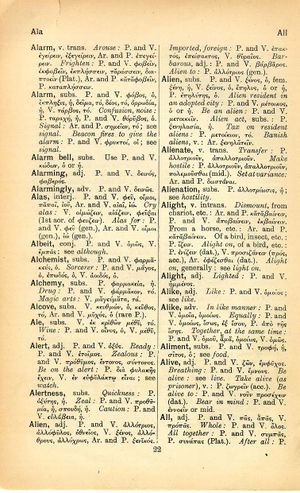all: Difference between revisions
ἕτερος ἐξ ἑτέρου σοφός τό τε πάλαι τό τε νῦν → one gets his skill from another, now as in days of old
(Woodhouse 2) |
(CSV3) |
||
| Line 1: | Line 1: | ||
{{ | {{Woodhouse1 | ||
| | |Text=[[File:woodhouse_22.jpg|thumb|link={{filepath:woodhouse_22.jpg}}]]'''adj.''' | ||
P. and V. πᾶς, [[ἅπας]], V. [[πρόπας]]. | |||
<b class="b2">Whole</b>: P. and V. [[ὅλος]]. | |||
<b class="b2">All together</b>: P. and V. [[σύμπας]], P. [[συνάπας]] (Plat.). | |||
<b class="b2">After all</b>: P. and V. ἄρα, V. ἆρα. | |||
<b class="b2">All but</b>: P. and V. ὅσον [[οὔπω]], P. ὅσον οὐ. | |||
<b class="b2">Nearly</b>: Ar. and P. ὀλίγου. | |||
<b class="b2">They are all but here</b>: P. ὅσον [[οὔπω]] πάρεισι (Thuc.) | |||
<b class="b2">They took one ship, crew and all</b>: P. μίαν (ναῦν) αὐτοῖς ἀνδράσιν εἷλον (Thuc. 2, 90). | |||
<b class="b2">The black abyss of Tartarus hides old Cronos, allies add all</b>: V. Ταρτάρου [[μελαμβαθής]] κευθμὼν καλύπτει τον παλαιγενῆ Κρόνον, αὐτοῖσι συμμάχοισι (Aesch., ''P.V.'' 219, cf. Eur., ''Cycl.'' 705). | |||
<b class="b2">At all events</b>: P. and V. γε (enclitic), [[γοῦν]]. | |||
<b class="b2">One's all</b>: P. τὰ ὅλα. | |||
<b class="b2">At all, in any way</b>: P. and V. πως (enclitic), Ar. and P. πη (enclitic). | |||
<b class="b2">Not at all</b>: P. and V. ἀρχὴν οὐ, P. οὐχ ὅλως, Ar. and P. οὐ τὸ παράπαν, V. οὐ τὸ πᾶν. | |||
<b class="b2">By no means</b>: P. and V. [[οὐδαμῶς]], [[μηδαμῶς]], P. οὐδʼ ὁπωστιοῦν. | |||
<b class="b2">All the more</b>: P. and V. τοσῷδε [[μᾶλλον]], τοσούτῳ [[μᾶλλον]]. | |||
<b class="b2">All the less</b>: P. and V. τοσῷδε ἧσσον. | |||
<b class="b2">On all grounds</b>: P. and V. [[πανταχῆ]]. | |||
<b class="b2">Run on all fours</b>: V. τρέχειν χερσίν (Aesch., <b class="b2">Eum.</b> 37). | |||
<b class="b2">It is all over with</b>: see [[over]]. | |||
<b class="b2">All in all</b>: see [[everything]]. | |||
<b class="b2">It is all one</b>: see [[one]]. | |||
}} | }} | ||
Revision as of 09:18, 21 July 2017
English > Greek (Woodhouse)
adj.
P. and V. πᾶς, ἅπας, V. πρόπας.
Whole: P. and V. ὅλος.
All together: P. and V. σύμπας, P. συνάπας (Plat.).
After all: P. and V. ἄρα, V. ἆρα.
All but: P. and V. ὅσον οὔπω, P. ὅσον οὐ.
Nearly: Ar. and P. ὀλίγου.
They are all but here: P. ὅσον οὔπω πάρεισι (Thuc.)
They took one ship, crew and all: P. μίαν (ναῦν) αὐτοῖς ἀνδράσιν εἷλον (Thuc. 2, 90).
The black abyss of Tartarus hides old Cronos, allies add all: V. Ταρτάρου μελαμβαθής κευθμὼν καλύπτει τον παλαιγενῆ Κρόνον, αὐτοῖσι συμμάχοισι (Aesch., P.V. 219, cf. Eur., Cycl. 705).
At all events: P. and V. γε (enclitic), γοῦν.
One's all: P. τὰ ὅλα.
At all, in any way: P. and V. πως (enclitic), Ar. and P. πη (enclitic).
Not at all: P. and V. ἀρχὴν οὐ, P. οὐχ ὅλως, Ar. and P. οὐ τὸ παράπαν, V. οὐ τὸ πᾶν.
By no means: P. and V. οὐδαμῶς, μηδαμῶς, P. οὐδʼ ὁπωστιοῦν.
All the more: P. and V. τοσῷδε μᾶλλον, τοσούτῳ μᾶλλον.
All the less: P. and V. τοσῷδε ἧσσον.
On all grounds: P. and V. πανταχῆ.
Run on all fours: V. τρέχειν χερσίν (Aesch., Eum. 37).
It is all over with: see over.
All in all: see everything.
It is all one: see one.

